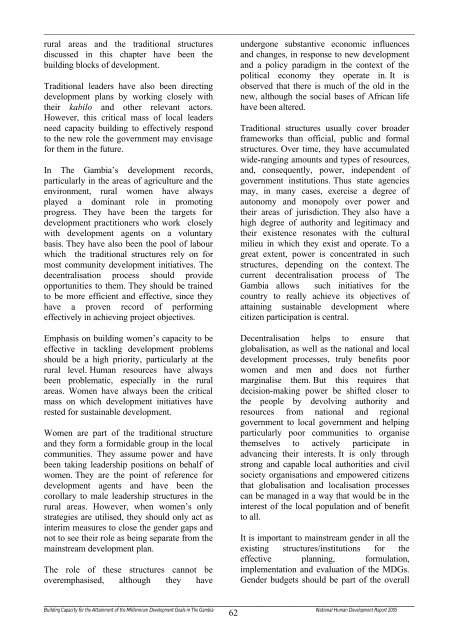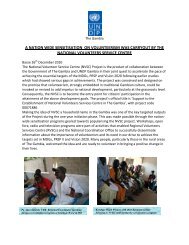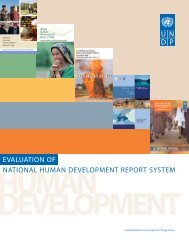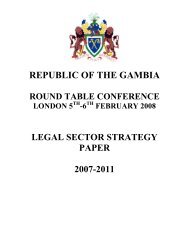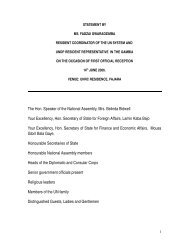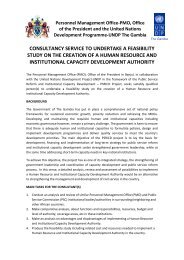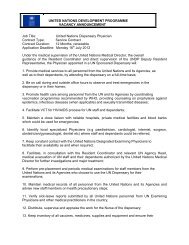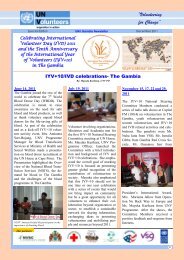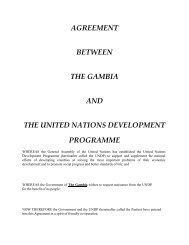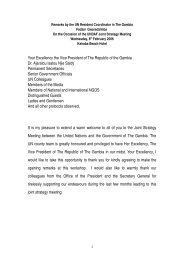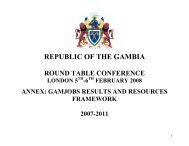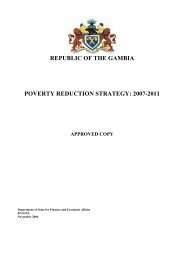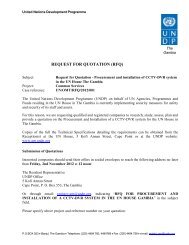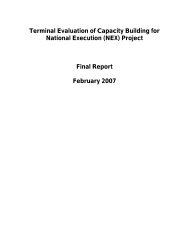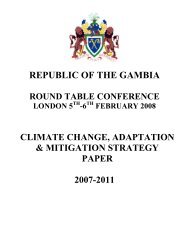Introduction - UNDP The Gambia
Introduction - UNDP The Gambia
Introduction - UNDP The Gambia
Create successful ePaper yourself
Turn your PDF publications into a flip-book with our unique Google optimized e-Paper software.
________________________________________________________________________________________________________________________<br />
rural areas and the traditional structures<br />
discussed in this chapter have been the<br />
building blocks of development.<br />
Traditional leaders have also been directing<br />
development plans by working closely with<br />
their kabilo and other relevant actors.<br />
However, this critical mass of local leaders<br />
need capacity building to effectively respond<br />
to the new role the government may envisage<br />
for them in the future.<br />
In <strong>The</strong> <strong>Gambia</strong>’s development records,<br />
particularly in the areas of agriculture and the<br />
environment, rural women have always<br />
played a dominant role in promoting<br />
progress. <strong>The</strong>y have been the targets for<br />
development practitioners who work closely<br />
with development agents on a voluntary<br />
basis. <strong>The</strong>y have also been the pool of labour<br />
which the traditional structures rely on for<br />
most community development initiatives. <strong>The</strong><br />
decentralisation process should provide<br />
opportunities to them. <strong>The</strong>y should be trained<br />
to be more efficient and effective, since they<br />
have a proven record of performing<br />
effectively in achieving project objectives.<br />
undergone substantive economic influences<br />
and changes, in response to new development<br />
and a policy paradigm in the context of the<br />
political economy they operate in. It is<br />
observed that there is much of the old in the<br />
new, although the social bases of African life<br />
have been altered.<br />
Traditional structures usually cover broader<br />
frameworks than official, public and formal<br />
structures. Over time, they have accumulated<br />
wide-ranging amounts and types of resources,<br />
and, consequently, power, independent of<br />
government institutions. Thus state agencies<br />
may, in many cases, exercise a degree of<br />
autonomy and monopoly over power and<br />
their areas of jurisdiction. <strong>The</strong>y also have a<br />
high degree of authority and legitimacy and<br />
their existence resonates with the cultural<br />
milieu in which they exist and operate. To a<br />
great extent, power is concentrated in such<br />
structures, depending on the context. <strong>The</strong><br />
current decentralisation process of <strong>The</strong><br />
<strong>Gambia</strong> allows such initiatives for the<br />
country to really achieve its objectives of<br />
attaining sustainable development where<br />
citizen participation is central.<br />
Emphasis on building women’s capacity to be<br />
effective in tackling development problems<br />
should be a high priority, particularly at the<br />
rural level. Human resources have always<br />
been problematic, especially in the rural<br />
areas. Women have always been the critical<br />
mass on which development initiatives have<br />
rested for sustainable development.<br />
Women are part of the traditional structure<br />
and they form a formidable group in the local<br />
communities. <strong>The</strong>y assume power and have<br />
been taking leadership positions on behalf of<br />
women. <strong>The</strong>y are the point of reference for<br />
development agents and have been the<br />
corollary to male leadership structures in the<br />
rural areas. However, when women’s only<br />
strategies are utilised, they should only act as<br />
interim measures to close the gender gaps and<br />
not to see their role as being separate from the<br />
mainstream development plan.<br />
<strong>The</strong> role of these structures cannot be<br />
overemphasised, although they have<br />
Decentralisation helps to ensure that<br />
globalisation, as well as the national and local<br />
development processes, truly benefits poor<br />
women and men and does not further<br />
marginalise them. But this requires that<br />
decision-making power be shifted closer to<br />
the people by devolving authority and<br />
resources from national and regional<br />
government to local government and helping<br />
particularly poor communities to organise<br />
themselves to actively participate in<br />
advancing their interests. It is only through<br />
strong and capable local authorities and civil<br />
society organisations and empowered citizens<br />
that globalisation and localisation processes<br />
can be managed in a way that would be in the<br />
interest of the local population and of benefit<br />
to all.<br />
It is important to mainstream gender in all the<br />
existing structures/institutions for the<br />
effective planning, formulation,<br />
implementation and evaluation of the MDGs.<br />
Gender budgets should be part of the overall<br />
________________________________________________________________________________________________<br />
Building Capacity for the Attainment of the Millennium Development Goals in <strong>The</strong> <strong>Gambia</strong> National Human Development Report 2005<br />
62


